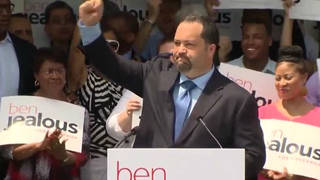
Guests
- Norm Stamperformer chief of the Seattle Police Department and the author of the new book To Protect and to Serve: How to Fix America’s Police.
A Facebook Live video has gone viral of a black female police officer speaking out against police violence. “If you’re afraid to go and talk to an African-American female or a male, or a Mexican male or female, because they’re not white like you, take the uniform off!” said Nakia Jones of Warrensville Heights, Ohio. “You have no business being a police officer, because there’s many of us that will give our life for anybody, and we took this oath, and we meant it! If you are that officer that’s prejudiced, take the uniform off and put the KKK hoodie on, because I will not stand for that!” We air the video and get response from former Seattle Police Chief Norm Stamper.
Transcript
NERMEEN SHAIKH: Well, a Facebook live video has gone viral of a black female police officer speaking out against police violence. This is Officer Nakia Jones of Warrensville Heights, Ohio.
NAKIA JONES: How dare you stand next to me in the same uniform and murder somebody! How dare you! You ought to be ashamed of yourself! So, why don’t we just keep it real. If you’re that officer, that know good and well you’ve got a god complex, you’re afraid of people that don’t look like you, you have no business in that uniform. Take it off! If you’re afraid to go and talk to an African-American female or a male, or a Mexican male or female, because they’re not white like you, take the uniform off! You have no business being a police officer, because there’s many of us that will give our life for anybody, and we took this oath, and we meant it! If you are that officer that’s prejudiced, take the uniform off and put the KKK hoodie on!
NERMEEN SHAIKH: That was Officer Nakia Jones speaking from Warrensville Heights, Ohio. Norm Stamper, your response to what she said?
NORM STAMPER: I’ve heard that six times now, maybe, and each time I get goosebumps, and each time I get a little emotional. Everybody’s talking about a conversation about race. I believe in dialogue. I believe it’s important for us to expose our true feelings in safe settings. I really do believe in all of that. But I also believe very firmly that white police officers, those who are so inclined to act on whatever prejudice they may have, need to listen to this woman. They need to hear every single word she said. She is expressing the rage of an entire people. She is expressing her truth about her fellow—her brothers and sisters in law enforcement. How dare they exhibit the kind of racism that suggests, among other things, their own internal prejudice and their own fear? If prejudice means anything, it means ignorance and fear. And if we don’t confront it forcefully, as she has done, I’m afraid we’re going to continue to have polite conversations that will get us nowhere.
AMY GOODMAN: Norm Stamper, why aren’t these police officers who we’re seeing on video gun down people, whether it is Alton Sterling or Philando Castile, whether it is here in New York, Delrawn Small, a man who now we have a video of, was involved in some kind of traffic altercation with another man, went up to his car, the man blew him away—it turned out he was just coming off the job as a police officer that night, Wayne Isaacs. We have the video; there is the evidence. Why aren’t these police officers arrested?
NORM STAMPER: In part—I’ll speak for the state of Washington—we have laws on the books that require malice of intent to be established. The King County prosecutor, in which Seattle is one of the cities, has said these are awful, but lawful, instances. He would like to prosecute, for example, the police officer that shot and killed a man in 2010 in Seattle. It was a terrible shooting. It was an egregious shooting. In fact, the department called it that, I’m pleased to say. And as they were preparing to fire this individual, he quit, so he avoided dismissal from the force, although technically you can call that a constructive termination. But the satisfaction that comes from firing a cop who does something like this pales by comparison to the prosecution of a police officer who, if he was a—if he were a citizen in the African-American community, would be prosecuted. And people see this, and people wonder about it. How does justice apply to one group and not another group? That speaks, certainly, to the larger institutional issue, which does get to our laws. It also gets to the need for independent prosecution of these cases.












Media Options